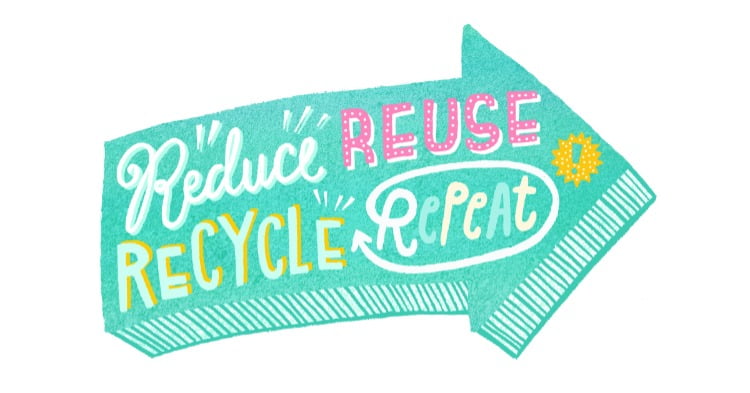The UK Environment Agency continually calls on the nation to reduce, reuse and recycle as much of our waste as possible. It's for our own good! Read-on to find out all you could want to know about it!

Back in 2007, Barbara Young, Chief Executive of the Environment Agency, said:
“We need to improve our reuse and recycling of waste and ideally, not produce it in the first place.
“Landfill should be the last resort for waste that we can't recover or recycle, as it is not sustainable to keep sending it to landfill. The data give a clear indication of which regions have the greatest challenges.”
Today, it is no different although in 2018 UK recycling is now running at about 45% of all household and commercial waste. (Scroll down to the bottom of this page to read the original “Reduce, Reuse and Recycle” article.)
Want to Know How to “Reduce, Reuse and Recycle”? Read the suggestions in the graphic below:
Reduce, Reuse, Recycle US EPA
Learn how reducing, reusing, and recycling can help you, … Reduce and Reuse. Reduce and reuse basics and benefits; Reuse by donating your stuff;
Reducing and Reusing Basics
The most effective way to reduce waste is to not create it in the first place. Making a new product requires a lot of materials and energy – raw materials must be extracted from the earth, and the product must be fabricated then transported to wherever it will be sold. As a result, reduction and reuse are the most effective ways you can save natural resources, protect the environment and save money.
Benefits of Reducing and Reusing
- Prevents pollution caused by reducing the need to harvest new raw materials
- Saves energy
- Reduces greenhouse gas emissions that contribute to global climate change
- Helps sustain the environment for future generations
- Saves money
- Reduces the amount of waste that will need to be recycled or sent to landfills and incinerators
- Allows products to be used to their fullest extent
… via Reduce, Reuse, Recycle | US EPA
The Three R's of the Environment
Reuse
Instead of throwing things away, try to find ways to use them again! For example:
- Bring cloth sacks to the store with you instead of taking home new paper or plastic bags. You can use these sacks again and again. You'll be saving some trees!
- Plastic containers and reusable lunch bags are great ways to take your lunch to school without creating waste.
- Coffee cans, shoe boxes, margarine containers, and other types of containers people throw away can be used to store things or can become fun arts and crafts projects. Use your imagination!
- Don't throw out clothes, toys, furniture, and other things that you don't want anymore. Somebody else can probably use them. You can bring them to a center that collects donations, give them to friends, or even have a yard sale.
- Use all writing paper on both sides.
- Use paper grocery bags to make book covers rather than buying new ones.
- Use silverware and dishes instead of disposable plastic utensils and plates.
- Store food in reusable plastic containers.
Recycle
Many of the things we use every day, like paper bags, soda cans, and milk cartons, are made out of materials that can be recycled. Recycled items are put through a process that makes it possible to create new products out of the materials from the old ones.
In addition to recycling the things you buy, you can help the environment by buying products that contain recycled materials. Many brands of paper towels, garbage bags, greeting cards, and toilet paper, to name a few examples, will tell you on their labels if they are made from recycled materials.
In some towns you can leave your recyclables in bins outside your home, and a truck will come and collect them regularly. Other towns have recycling centres where you can drop off the materials you've collected.
Things like paper and plastic grocery bags, and plastic and aluminium cans and bottles can often be brought to the grocery store for recycling.
Whatever your system is, it's important to remember to rinse out and sort your recyclables!
… via The Three R's of the Environment – Fact Monster
Reduce, Reuse, Recycle – A Recycling Guide
There are three key factors when thinking about how to recycle – The 3 R’s:
Recycling Different Materials
You can find out how to recycle different materials such as Glass, Batteries and Mobile Phones by simply using our list on the right hand side.
Recycling Etiquette
What’s in your Rubbish Bin?
A large percentage of UK household’s still do not recycle enough and throw everything that they consider ‘rubbish’ into their ordinary bin.
Much of this waste can be recycled and should be disposed of separately to general household waste. Look inside this rubbish bin to see how much of the contents should actually have been recycled. Check our list on the right to see how to recycle different materials. … via Reduce, Reuse, Recycle « Recycling Guide
The 3 R's for Kids
Download Free Android App of “Smart Learning for All” @ https://goo.gl/ZvPxzt
The 3R's: Reduce, Reuse and Recycle
Do you know what the 3R's stand for? The 3R's stand for Reduce, Reuse and Recycle.
- We must reduce the use of plastic bags. We suggest you use cloth or jute bags while shopping.
- Reduce kitchen wastes by converting them into vermicompost.
- Save water by taking short showers.
- Save water by closing taps while brushing teeth.
- Reduce the use of electricity, that is, we should turn off fans and lights when we leave a room.
- Donate old clothes and toys so that they can be reused.
- Old newspapers can be reused for wrapping gifts.
- Ice cream sticks, old decorations etc can be reused to make greeting cards.
- Recycle old magazines, newspapers and used notebooks.
- Recycled old soda cans, milk containers and juice cans.
- Recycle old electronic items like cell phones, computers and televisions.
- If we reduce, reuse and recycle, we can live in a cleaner, safer and happier environment.
Subscribe to our YouTube channel: Smart Learning for All. via The 3 R's – Reduce, Reuse, Recycle – YouTube
3 Ways to Reduce, Reuse, and Recycle
Reader Approved
Three Methods:
- Reduce Your Use of Materials and Energy
- Reuse a Variety of Goods
- Getting Into the Recycling Habit
You may be familiar with the motto from the environmental movement, “Reduce, Reuse, Recycle.” These three actions are all focused on reducing waste, whether through the conservation of raw materials and energy, or the reuse and recycling of products. You can do your part in reducing waste by watching what you buy and reconsidering what you do with it once it is no longer useful to you. There are also several simple habits to adopt that will allow you to consume less water and electricity. Being green isn't time-consuming, it saves you money, and gives you a sense of satisfaction from making environmentally friendly choices.
Steps – Method 1
Reduce Your Use of Materials and Energy
- Avoid single-serve or individually wrapped items.
- Shop at stores that have bulk dispensers for grains, nuts, dried fruits, and snacks.
- Bring your own plastic bag or container to put the bulk food in. And,
- try to buy bulk sizes of food or sanitary products, which saves on packaging.
- When buying produce at the grocery store, avoid packing the product in an extra plastic bag if it isn’t necessary.
- Vegetables such as potatoes, onions, peppers, tomatoes, beets; and fruits such as bananas, apples, plums, and melons shouldn’t require an extra bag.
- Instead of buying canned soup or pasta sauce, read-up in a cookbook how prepare these at home.
- Practice “precycling” by only buying products whose materials can be recycled. via 3 Ways to Reduce, Reuse, and Recycle – wikiHow
The Benefits when we “Reduce, Reuse and Recycle”
Following the “three R's” has several advantages, including cutting greenhouse gas emissions, conserving energy and resources and reducing the need for landfills and incineration. Recycling also protects U.S. manufacturing jobs, according to the EPA.
via What Is Reduce, Reuse & Recycle? | Home Guides | SF Gate
[box type=”note” style=”rounded” border=”full”]In the section below you will find our original post on this page, back in 2007. Essentially nothing has changed since that day. The EA still wants us to minimise our waste – reduce, re-use, and recycle it! It will always be so![/box]
More Effort Needed to ‘Reduce, Reuse and Recycle' says UK Environment Agency
The Environment Agency yesterday (Thursday, 11 January 2007) called on the nation to reduce, reuse and recycle as much of our waste as possible.
The call comes as the Environment Agency publishes the latest figures on what happens to our waste in England and Wales.
Barbara Young, Chief Executive of the Environment Agency, said: “The good news is we are recycling more and have sent nine per cent less waste to landfill in England and Wales since 2001. However, the report also highlights that we need to improve our reuse and recycling of waste and ideally, not produce it in the first place.
“Landfill should be the last resort for waste that we can't recover or recycle, as it is not sustainable to keep sending it to landfill. The data give a clear indication of which regions have the greatest challenges. For example if we continue to landfill at current rates, existing landfill capacity in Wales, East Anglia and London could be full by the end of the decade. The space available to fill with waste has fallen by more than 30% in some areas since 1998/9.
‘These figures are projections and do not necessarily mean that we will physically run out of landfill space, because new sites may open. This report will be helpful to local authorities who are responsible for handling and managing municipal waste.'
‘There are examples of where both businesses and consumers can reduce, reuse and recycle more.'
‘Take Christmas as an example – on average this Christmas we will have used an extra 750 million bottles and glass containers, and 500 million drinks cans, yet we don't end up recycling more of them.'
‘This is an example where both business and consumers need to look to reduce, reuse and recycle more. By making small changes, we can work towards reducing our dependence on landfills as we are still burying too much of our rubbish.'
The data for the year 2004/5 shows:
- We are recycling at an increasing rate – 23.5% for municipal waste (rising in England to 27.1% in 2005/6 according to Defra) and 44% for industrial waste;
- We are recovering and re-using more waste – waste inputs at material recovery and composting sites have tripled since 2001 to 5.3m tonnes;
- There are fewer hazardous waste disposal sites – only twelve commercial land fill sites and 50 private sites are licensed, concentrated in a central belt between Lancashire and Northamptonshire.
- No sites exist in Wales and only one in the South West of England;
- Overall production of hazardous waste has been falling gradually since 2001. This trend was interrupted by an increase of 50% in hazardous construction and demolition waste to landfill in 2004 (up by more than half a million tonnes), as contaminated land clearance schemes were brought forward to beat restrictions imposed by the Landfill Directive;
- 200,000 premises registered as producers of hazardous waste and 1,000 companies were involved in its transport, treatment of disposal;
- Out of 1,000 licensed landfill sites operational last year, only 350 were accepting municipal waste.
- The report also highlights that landfilling is set to become more expensive as we move our waste greater distances which in turn means more harmful emissions into the air. By reducing waste sent to landfill, we can reduce the impact waste management has on our environment.
Barbara Young added:
“Defra's Waste Strategy is currently under review and we hope it will reinforce the need to produce less waste and recover, glass, paper and other raw materials in greater quantities as we apply new methods to deal with our waste. This will present new business opportunities as new markets develop for the raw materials previously disposed of as waste.”
More …






Great article. We l-u-u-u-ved it. lol! But, don’t forget to trade in your old major appliances for new ones with the Energy Star rating. The Energy Star rating guarantees that the appliance you are using has been built to use much less energy than its non-rated predecessor. For refrigerators and freezers, the rating promises 20% less energy used, for dishwashers 40% less energy used and for washing machines at least 50% less energy used!
Used it with my secondary school class. Simple but powerful. And hilarious lol?
Yes. There has to be something we can do with the trash recycle it somehow?.
Thanks. I have and idea that can solve this problem.
Good you have great ideas?
This page its a nice way to make a rallying call. Also for kids to learn about wastes..? Reduce, Reuse and recycle etc
Hi ,this is a brilliant and informative site regarding recycle material from household and commercial premises.i live in Cumbernauld which is not far from Glasgow and I have noticed recycle materials from cardboard to tin cans etc dumped in the streets and industrial estates which have been lying there for ages as no one has lifted them .it’s not just a problems in my home town but everywhere .I there were workers going around industrial estates ,forestry areas etc the places would be tidier and also safe to work .your site tells people what to recycle which is great but what about the costs of collecting cans and glass them taking them to a recycling plant .I read if you collect cans you can get a penny for a can ,is that true .? I also read that there are recycle machine s that give you voucher s if you return cans and glass containers to be recycled.why has the big supermarket s not got a facility that does this ?, surely if the supermarket make hundred s of millions of pounds a year can afford a recycling machine.
Steven
I read your comment with interest and agree that there should be some way for people to recycle items to the shops where they were bought, or to a recycling plant and be given at least some money for the materials in them, if not for re-using them.
The UK waste industry is working on a scheme to provide machines in supermarkets which will pay for returned re-usable containers of all types. In my opinion most people want this to happen and I am hoping that this year we will start to see the first supermarkets doing this.
The best way for you to speed up this process and influence people is, by taking every opportunity you get, to simply tell people what you have written in your comment here.
If you are not doing it already. It’s not a bad idea to go onto the feedback websites of your local stores and ask when they are going to start taking their containers back.
Companies do often say to people like me that they have no objection to doing much more recycling, but the public don’t really seem interested. They know it makes sense, but it’s a risk for them to invest in the “reverse vending” machines needed. They are worried that the public won’t use them, so they are not doing it.
That’s where you can make a difference by showing that you do care, and will use them.
Hey, thanks for a great post, it seems everyone these days is getting more interested in saving the environment. This article is 2 years old now. How about updating, cause I’d like to know what percentage of UK household’s still do not recycle enough and throw everything that they consider ‘rubbish’ into their ordinary bin.